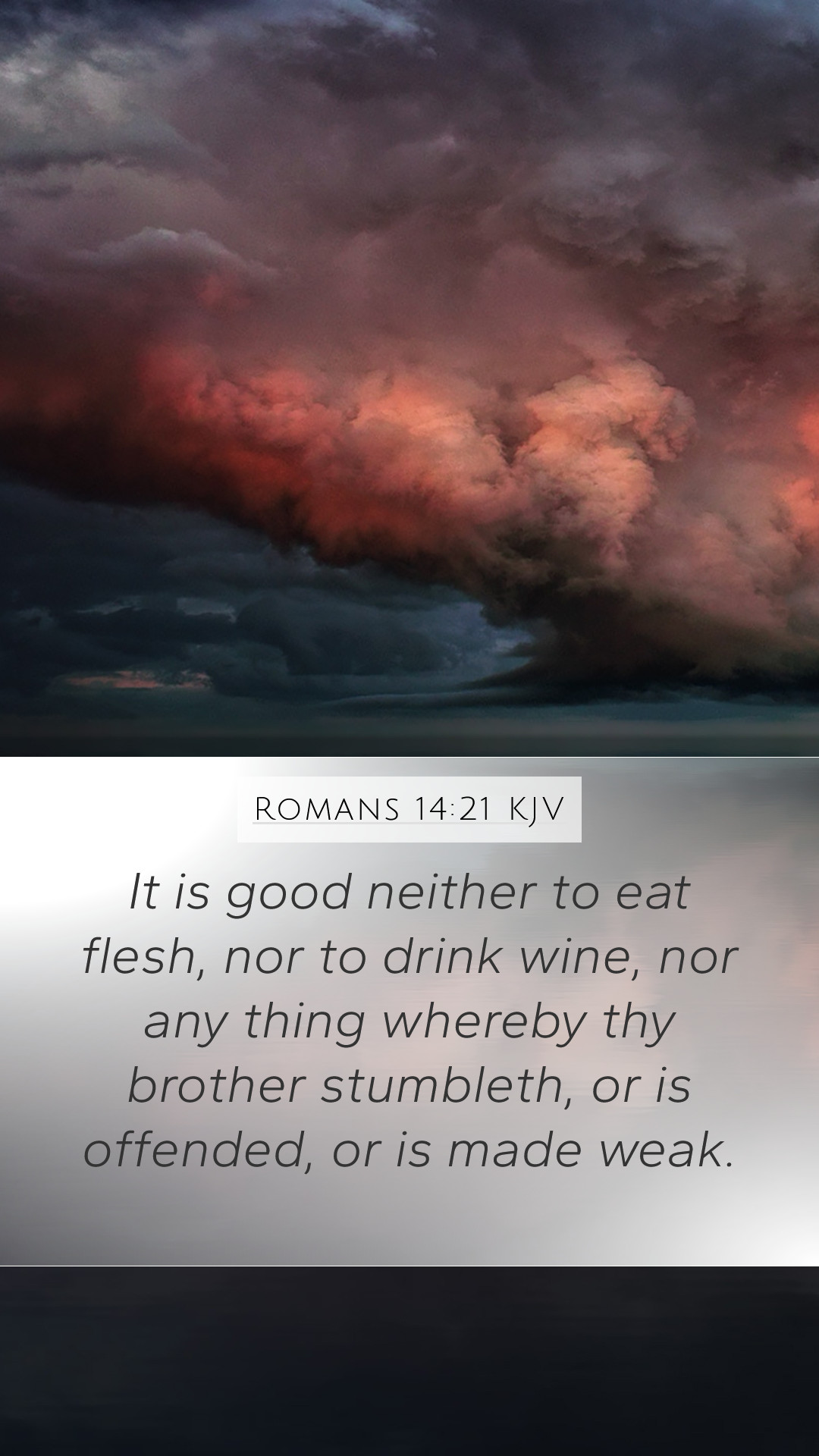Old Testament
Genesis Exodus Leviticus Numbers Deuteronomy Joshua Judges Ruth 1 Samuel 2 Samuel 1 Kings 2 Kings 1 Chronicles 2 Chronicles Ezra Nehemiah Esther Job Psalms Proverbs Ecclesiastes Song of Solomon Isaiah Jeremiah Lamentations Ezekiel Daniel Hosea Joel Amos Obadiah Jonah Micah Nahum Habakkuk Zephaniah Haggai Zechariah MalachiRomans 14:21 Meaning
What is the meaning of Romans 14:21?
It is good neither to eat flesh, nor to drink wine, nor any thing whereby thy brother stumbleth, or is offended, or is made weak.
Romans 14:21 Bible Verse Meaning
Bible Verse Meaning of Romans 14:21
Verse: Romans 14:21 states, "It is good neither to eat flesh, nor to drink wine, nor anything whereby thy brother stumbleth, or is offended, or is made weak." This verse encapsulates the themes of consideration and love within the Christian community.
Summary of Interpretations
The meaning of this Bible verse can be analyzed through various lenses as provided by prominent public domain commentaries.
Albert Barnes Commentary
Albert Barnes emphasizes that the watchfulness over our actions is crucial. The "eating" and "drinking" mentioned pertain to practices that may cause others to falter in their faith. Barnes conveys the principle that Christians should prioritize the spiritual well-being of others above their own liberty, highlighting the importance of sacrifice for the sake of love.
Matthew Henry Commentary
Matthew Henry offers a profound insight into the necessity of abstaining from practices that could lead others into sin. He points out that the Christian life is marked by the exercise of love and forbearance, which can often mean setting aside personal rights for the sake of a brother’s conscience. Henry’s exposition reflects on how the attitude of love manifests through careful conduct in community.
Adam Clarke Commentary
Adam Clarke explains the cultural and historical context surrounding the verse, noting that in the early church, meat offered to idols and the consumption of wine were contentious topics. Clarke stresses that while Christian liberty allows for personal freedom, it must never come at the expense of a fellow believer's convictions or spiritual growth.
Key Themes in Romans 14:21
- Community Consideration: The verse underscores that Christians are called to be sensitive to the convictions and weaknesses of others.
- Love as a Guiding Principle: The undercurrent of love should guide all actions, especially in matters of personal liberty.
- Spiritual Edification: Engaging in activities that could weaken another’s faith contradicts the intent of Christian behavior.
Applications in Daily Life
Understanding Scripture is crucial when it comes to applying it to daily life. Romans 14:21 encourages believers to think critically about their actions and the possible effects on others:
- In Bible study groups, discussing how personal liberties might impact others can foster deeper relationships.
- Online Bible study can include practical lessons on self-control and love as outlined in this verse.
- Utilizing Bible study tools to explore contextual meaning can help in grasping the broader implications of such teachings.
Related Bible Cross References
- 1 Corinthians 8:9 - Addresses the idea of freedom versus offense.
- Galatians 5:13 - Discusses serving one another through love.
- 1 Corinthians 10:23-24 - Speaks to the balance between liberty and love for others.
Conclusion
Romans 14:21 serves as a reminder that the actions of believers should reflect their commitment to love and lift one another up in faith. This verse is not just about dietary laws but about the heart with which we engage with our fellow believers.


